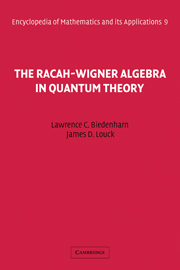Book contents
- Frontmatter
- Contents
- Contents of companion volume
- Editor's Statement
- Section Editor's Foreword
- Preface
- Acknowledgments
- Introduction by George W. Mackey
- The Racah–Wigner Algebra in Quantum Theory
- Chapter 1 Introduction
- Chapter 2 Algebraic Structures Associated with Wigner and Racah Operators
- Chapter 3 Null Space Properties and Structure Theorems for RW-Algebra
- Chapter 4 W-Algebra: An Algebra of Invariant Operators
- Chapter 5 Special Topics
- Appendix of Tables
- List of Symbols
- Author Index
- Subject Index
Chapter 1 - Introduction
Published online by Cambridge University Press: 05 June 2013
- Frontmatter
- Contents
- Contents of companion volume
- Editor's Statement
- Section Editor's Foreword
- Preface
- Acknowledgments
- Introduction by George W. Mackey
- The Racah–Wigner Algebra in Quantum Theory
- Chapter 1 Introduction
- Chapter 2 Algebraic Structures Associated with Wigner and Racah Operators
- Chapter 3 Null Space Properties and Structure Theorems for RW-Algebra
- Chapter 4 W-Algebra: An Algebra of Invariant Operators
- Chapter 5 Special Topics
- Appendix of Tables
- List of Symbols
- Author Index
- Subject Index
Summary
It has been the purpose of the monograph Angular Momentum in Quantum Physics (AMQP) to develop comprehensively those aspects of angular momentum theory that are required in carrying out research in modern physics and chemistry. The emphasis there was principally on physical concepts and the symmetry principles that underlie the general applicability of angular momentum theory to a broad area of physical phenomena. Mathematical techniques were introduced within the context of the physical concepts themselves.
Physical applications of angular momentum theory are to a large extent applications of specific properties of Wigner or Racah functions (more generally of 3n-j coefficients) or of the representation functions themselves. Such applications tend to emphasize the “numerical” aspects of these functions and thus obscure the relationships to other areas of mathematics.
The purpose of the present monograph is to show by specific examples the many interrelations that exist between concepts originating in angular momentum theory and various areas of mathematics. It turns out that this is a substantial task—the diversity of the interrelations is far greater than might be thought.
Even a brief acquaintance with the contents of AMQP will show that the concept that recurs again and again in physical applications is that of an irreducible tensor operator with respect to a group [in our case, SU(2), the quantal rotation group]. Indeed, it is this concept that carries the mathematical apparatus of the physical theory beyond the related but much simpler results of the Lie algebraic theory of the angular momentum itself and the implied representation theory of the group SU(2).
- Type
- Chapter
- Information
- The Racah-Wigner Algebra in Quantum Theory , pp. 1 - 5Publisher: Cambridge University PressPrint publication year: 1984

